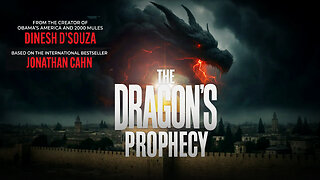Premium Only Content

Sexual Harassment or Felony Robbery?
The Medium is the Message!
Herbert Marshall McLuhan (July 21, 1911 – December 31, 1980) was a Canadian philosopher whose work is among the cornerstones of the study of media theory. Raised in Winnipeg, McLuhan studied at the University of Manitoba and the University of Cambridge. He began his teaching career as a professor of English at several universities in the United States and Canada before moving to the University of Toronto in 1946, where he remained for the rest of his life. He is known as the "father of media studies".
McLuhan coined the expression "the medium is the message” (in the first chapter of his Understanding Media: The Extensions of Man), as well as the term global village. He predicted the World Wide Web almost 30 years before it was invented. He was a fixture in media discourse in the late 1960s, though his influence began to wane in the early 1970s. In the years following his death, he continued to be a controversial figure in academic circles. However, with the arrival of the Internet and the World Wide Web, interest was renewed in his work and perspectives.
In the early 1950s, McLuhan began the Communication and Culture seminars at the University of Toronto, funded by the Ford Foundation. As his reputation grew, he received a growing number of offers from other universities. During this period, he published his first major work, The Mechanical Bride (1951), in which he examines the effect of advertising on society and culture. Throughout the 1950s, he and Edmund Carpenter also produced an important academic journal called Explorations. McLuhan and Carpenter have been characterized as the Toronto School of communication theory, together with Harold Innis, Eric A. Havelock, and Northrop Frye. During this time, McLuhan supervised the doctoral thesis of modernist writer Sheila Watson on the subject of Wyndham Lewis. Hoping to keep him from moving to another institute, the University of Toronto created the Centre for Culture and Technology (CCT) in 1963.
At a Fordham University lecture in 1999, Tom Wolfe suggested that a major under-acknowledged influence on McLuhan's work is the Jesuit philosopher Pierre Teilhard de Chardin, whose ideas anticipated those of McLuhan, especially the evolution of the human mind into the "noosphere." In fact, McLuhan warns against outright dismissing or whole-heartedly accepting de Chardin's observations early on in his second published book The Gutenberg Galaxy.
-
 29:02
29:02
Rehypothecation1
3 days agoMark Sanchez, USC, Rose Bowl, NFL felony crimes
6016 -
 8:20
8:20
Freedom Frontline
15 hours agoChuck Schumer PANICS As Republican Senator EXPOSES His Double Standards
651 -
 35:04
35:04
Uncommon Sense In Current Times
16 hours agoPop Marxism & America’s History Crisis | Dr. Eric Patterson on Education, Freedom & Cultural Renewal
5.55K -
 7:18
7:18
The Shannon Joy Show
15 hours agoThe Medical Freedom Community is TURNING on Trump
6706 -
 1:56
1:56
NAG Daily
15 hours agoQUICKFIRE NEWS HEADLINES W/GreenMan Reports
19 -
 LIVE
LIVE
BEK TV
22 hours agoTrent Loos in the Morning - 10/10/2025
292 watching -
 LIVE
LIVE
The Bubba Army
21 hours agoKimmel Invites TRUMP On His Show | Bubba the Love Sponge® Show | 10/10/2025
2,928 watching -
 46:59
46:59
Coin Stories with Natalie Brunell
15 hours agoBorrow Dollars, Hold Bitcoin: The Debasement Play with Mauricio Di Bartolomeo
47.6K4 -
 2:59:23
2:59:23
Side Scrollers Podcast
20 hours agoAssassin’s Creed CIVIL War CANCELLED + Hasan Caught in LIE About Dog Collar + More | Side Scrollers
83.1K20 -
 1:33:41
1:33:41
Dinesh D'Souza
1 day agoThe Dragon's Prophecy Film
61.3K32